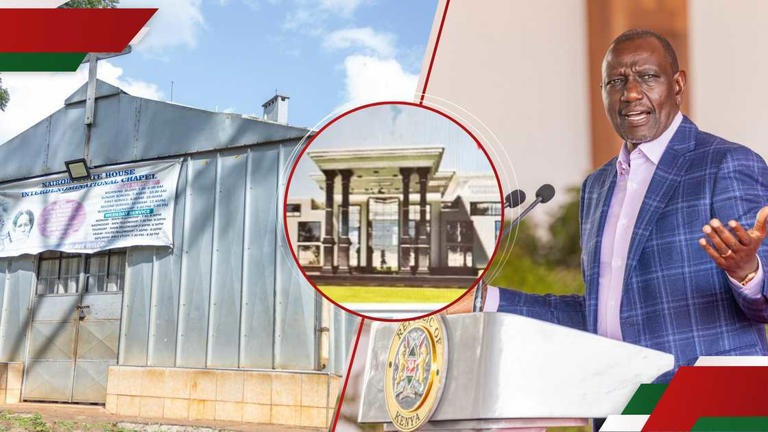Kenya’s President William Ruto has ignited fresh controversy after announcing plans to build a large church within the grounds of the official presidential residence in Nairobi, a project he insists he will finance personally and for which he refuses to apologize.
Speaking firmly on Friday, July 4, 2025, Ruto told assembled politicians at State House that he would not seek forgiveness or approval for the church’s construction.
“I am not going to ask anyone for an apology for building a church.
“The devil might be angry and can do what he wants,” he declared.
His statement immediately provoked backlash among many Kenyans already critical of his leadership and concerned about the blurring lines between church and state.
Ruto’s defiant remarks left many wondering who he meant by “the devil,” but he made it clear the project would proceed regardless.
“I did not start building this church when I entered State House.
“I found a church here, but one made out of iron sheets.
Does that look befitting for the State House?” he questioned, signaling his belief that the current makeshift structure was inadequate for the country’s highest office.
On the same day, Kenya’s Daily Nation newspaper published architectural renderings of the proposed church, depicting a grand building with expansive stained glass windows and seating for up to 8,000 worshippers.
The ambitious scale of the design raised eyebrows, prompting some to question whether such a religious edifice belongs on government property, especially in a nation constitutionally committed to secularism.
The project, estimated to cost approximately $9 million (£6.5 million), has drawn further criticism amid Kenya’s ongoing economic struggles.
Many citizens face rising living costs, and the timing of such a lavish undertaking has been widely questioned.
While Ruto insists that the church will be funded entirely from his personal resources, skeptics doubt whether it is appropriate or even legal for such a large structure to be erected on public land.
The controversy has escalated to the point where the Atheists Society of Kenya has threatened legal action to halt construction, condemning the project as “shocking and unacceptable.”
Harrison Mumia, head of the society, accused President Ruto of promoting Christian nationalism and undermining democratic principles.
“We want to remind him that Kenya does not belong to Christians only,” Mumia stated firmly, highlighting the country’s religious diversity.
Ruto himself is Kenya’s first evangelical Christian president, known for his deeply religious image that has earned him the nickname “Deputy Jesus” from both supporters and critics.
Throughout his political career, he has frequently quoted scripture and displayed emotional religious expressions in public, actions that have alienated some citizens who favor a more secular leadership style.
Before ascending to the presidency, while serving as deputy president, Ruto built a church at his official residence in Karen, Nairobi’s affluent suburb.
That facility has been used to host leaders from various faiths, reflecting a more inclusive approach.
However, the current project at State House represents a far more prominent and permanent religious installation, and no equivalent facilities exist on the presidential grounds for other faith communities.
Kenya’s religious makeup is diverse: about 85% of the population identifies as Christian, while Muslims comprise approximately 11%, alongside minority groups practicing Hinduism, traditional African religions, and other faiths.
Yet, there is no mosque, temple, or any non-Christian religious facility at the official residence, a fact that has not gone unnoticed amid growing concerns about inclusivity and respect for all religions.
The controversy has also drawn commentary from Nairobi’s Catholic Archbishop Philip Anyolo, who called for urgent clarity on the nature of the building.
Archbishop Anyolo warned that if the new church appears to endorse one Christian denomination over others, it could deepen divisions.
“We have to be very cautious with this.
“Such a structure ought to have been built in an area that is not a public institution,” he said.
“Unless what is being built is a chaplaincy, but that is also not clear.”
The debate touches on broader issues of church-state separation and religious freedom in Kenya, where the constitution guarantees a secular government and protection for all religious groups.
Critics argue that erecting such a grand religious monument at the seat of national power risks alienating minority communities and blurring important constitutional lines.
Despite the pushback, President Ruto’s determination to complete the church project remains firm.
His supporters see the move as an expression of faith and a statement about the nation’s identity.
However, with public opinion divided and legal challenges looming, the church at State House has become a flashpoint in Kenya’s ongoing debate over religion, governance, and national unity.
As the project moves forward, all eyes will remain on how the government balances respect for religious diversity with the president’s personal convictions and vision for the country.







